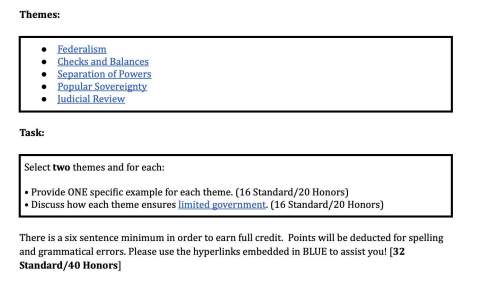FREE
Read the passage from Two Treatises of Government
(1690) by John Locke.
Which stat...

FREE
Read the passage from Two Treatises of Government
(1690) by John Locke.
Which statement best explains an Enlightenment
position on the divine right to rule?
This paternal, regal power being by divine right only
his, it leaves no room for human prudence, or consent,
to place it any where else, for if only one man hath a
divine right to the obedience of mankind, no body can
claim that obedience, but he that can shew that right;
nor can men's consciences, by any other pretence, be
obliged to it. And thus, this doctrine cuts up all
government by the roots.
O If only one person has the authority to rule, then no
one else, even members of government, may have
authority, so divine right undermines civil society.
O If only one person has the authority to rule, there
should be no confusion about how to follow the law,
so divine right supports the goals of civil society.
If only one person has the authority to rule, the
people will always eventually conflict with that ruler,
so divine right undermines civil society.
If only one person has the authority to rule, all of the
public servants they appoint will act in good faith, so
divine right supports the goals of civil society.
Mark this and return
Save and Exit
Next
Submit

Answers: 1


Another question on History

History, 22.06.2019 01:30
1. what was the result of growing nationalism and pan-africanism on european-african relations? africans were encouraged to seek independence from europe. european colonialism grew and strengthened in africa. the change of power from european to african rule went smoothly. africans believed they could live peacefully with europeans.
Answers: 2

History, 22.06.2019 01:30
Will give brainliest and a will put up a free point questionthe following question refers to a hypothetical situation. the 2010 supreme court case, wagner v. tritch, involves the illegal distribution of copyrighted material to foreign consumers via the internet, which is a new area of law. the 9-0, unanimous vote on the court is set to overturn the lower appellate court decision that augustus tritch was liable for millions of dollars to the plaintiff, frederick von wagner, for illegally distributing his book to overseas customers. now that the court has voted on the case, explain what must happen next? describe the different types of opinions that could come from the court.
Answers: 2

History, 22.06.2019 06:50
Which of the following was not a result of the industrial revolution in europe? a. the rise of a middle class b. the urbanization of europe's society advances in agriculture and industry d. the decline of europe's large cities
Answers: 2

History, 22.06.2019 07:30
Why was john wesleys message attractive to working class people?
Answers: 2
You know the right answer?
Questions

English, 02.09.2020 22:01




History, 02.09.2020 22:01

Chemistry, 02.09.2020 22:01


Business, 02.09.2020 22:01

Mathematics, 02.09.2020 22:01

Mathematics, 02.09.2020 22:01

Mathematics, 02.09.2020 22:01



Mathematics, 02.09.2020 22:01


Physics, 02.09.2020 22:01


Health, 02.09.2020 22:01


English, 02.09.2020 22:01




